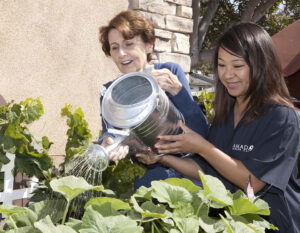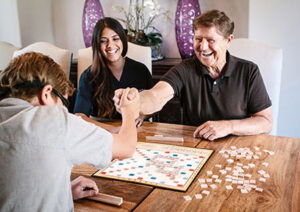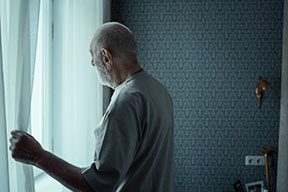It’s summertime! Time to enjoy gardening, picnicking, taking in outdoor craft shows and concerts in the park, and many more fresh air activities. It’s also the season when the risk for life-threatening dehydration soars. While embracing outdoor activities, be sure to stay proactive during the hot summer months and take steps to avoid dehydration, heat stroke, heat exhaustion, and fainting or dizzy spells.
Seniors are more vulnerable to the harmful effects of heat, as their bodies do not adjust as well to sudden changes in temperature. Experts point to chronic medical conditions and prescription medications impairing the body’s ability to react efficiently to rising temperature. Heat stroke, heat edema (swelling in your ankles and feet when you get hot), heat syncope (sudden dizziness), heat cramps, and heat exhaustion are among the many heat-related illnesses—collectively known as hyperthermia—that could be life-threatening for seniors.
A recent study by Climate Central found that that each year 12,000 Americans die from heat-related causes and that more than 80% of victims are older than 60. The National Institute of Aging points to these health-related factors that increase risk of hyperthermia:
- Poor blood circulation and inefficient sweat glands (often a result of aging).
- Chronic conditions such as heart, lung and kidney diseases.
- High blood pressure or a condition that requires a salt-restricted diet.
- Reduced sweating due to certain prescribed medications such as diuretics, heart and blood pressure drugs, and tranquilizers or sedatives.
- Being substantially overweight or underweight.
- Drinking alcoholic beverages.
- Being dehydrated.
Because of their training, Amada caregivers understand hot summer weather can be challenging for the elderly. They know how to help senior clients take steps to minimize their risk of health problems caused by heat and keep vigilant for signs of distress. The simplest protective steps that you or your senior loved can take are to drink plenty of water, access air conditioning as needed and wear sun-protection clothing. Here are six summer safety tips for seniors to beat the heat:
1) Stay hydrated. It is recommended that everyone drink 8 glasses of water each day, but especially those over 65. “Elderly individuals have a harder time knowing when they are dehydrated,” said Dr. Ronan Factora, geriatrician at the Cleveland Clinic. As a result, they are more prone to heat stroke.” Seniors also lose the ability to conserve water as they age. Avoid drinks containing caffeine and alcohol, as they will further dehydrate you. If you are outside or exercising, be sure to drink sweat replacement drinks to replace the extra water you lost.
2) Dress appropriately. Loose-fitting and light-colored clothes will keep you cool and not absorb as much heat from the sun. It’s best to wear breathable fabrics, such as cotton, to help regulate your temperature. A broad hat and sunglasses will keep the sun’s rays out of your face and eyes.
3) Wear sunscreen. This is especially pertinent for seniors, as many prescription medications make your skin more sensitive to the sun. Applying a broad-spectrum sunscreen with a SPF of 20 or higher will help you avoid sunburn.
4) Stay out of the sun. Check the forecast and avoid prolonged time in the sun, especially on days where the temperature reaches above 90 degrees. Try to plan any outside activities for the early morning or in twilight hours after the sun sets.
5) Spend time in air-conditioned places. If you want to get out of the house while avoiding the heat (or if your house isn’t air-conditioned), look for activities in spots with AC. With Covid-19 still at large, you’ll want to consider places that are less crowded or where there is plenty of room for social distancing, like a shopping mall, senior center or library.
6) Know when to cool down. If you’re feeling heated, take a tepid (not too hot or cold) bath or shower to cool down. You can also use cool washcloths on the neck, wrist, and armpits. Seniors are at a higher risk of heat-related illness due to health factors they are susceptible to such as poor circulation, heart disease, high blood pressure, and the inability to perspire due to certain medications. The following are health problems caused by heat and their warning signs:
| Health Problem | Definition | Warning Signs |
| Dehydration | A loss of water in the body | Weakness, headache, muscle cramps, dizziness, confusion, passing out |
| Heat Stroke | Dangerous rise in body temperature | Temperature of 103 or higher; red, hot, dry skin; fast pulse; headache; dizziness; nausea or vomiting; confusion; passing out |
| Heat Exhaustion | Caused by too much heat and dehydration and may lead to heat stroke | Heavy sweating or no sweating, muscle cramps, tiredness, weakness, paleness, cold or clammy skin, dizziness, headache, nausea or vomiting, fast and weak pulse, fainting |
| Heat Syncope | Fainting caused by high temperatures | Dizziness or fainting |
If you or a loved one experiences any of the symptoms above, move to a cool and shady place. If they are awake, try to get them to drink plenty of water/ and or sports drinks to replace electrolytes. In the case of heat stroke or heat exhaustion, seek medical attention immediately, especially if you have blood pressure or heart problems.
Minding sun safety guidelines and taking extra precautions to minimize risk will allow you or your senior loved one the opportunity to enjoy an active and safe summer.
“6 Summer Safety Tips for Seniors to Avoid Dehydration” written by Taylor French and Michelle Flores, Amada contributors.















